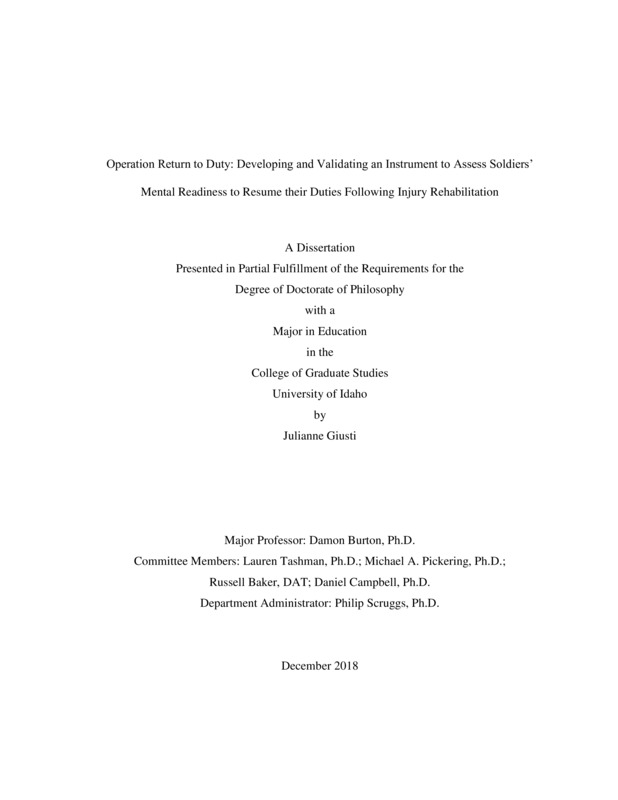Operation Return to Duty: Developing and Validating an Instrument to Assess Soldiers’ Mental Readiness to Resume their Duties Following Injury Rehabilitation
Giusti, Julianne. (2018-12). Operation Return to Duty: Developing and Validating an Instrument to Assess Soldiers’ Mental Readiness to Resume their Duties Following Injury Rehabilitation. Theses and Dissertations Collection, University of Idaho Library Digital Collections. https://www.lib.uidaho.edu/digital/etd/items/giusti_idaho_0089e_11465.html
- Title:
- Operation Return to Duty: Developing and Validating an Instrument to Assess Soldiers’ Mental Readiness to Resume their Duties Following Injury Rehabilitation
- Author:
- Giusti, Julianne
- Date:
- 2018-12
- Program:
- Movement & Leisure Sciences
- Subject Category:
- Psychology; Military studies
- Abstract:
-
The U.S. Armed Forces places strong emphasis on military readiness and fiscal spending, which are both detrimentally impacted by the increasing number of injuries suffered by service members (SMs; Booth-Kewley, Larson & Highfill-McRoy, 2009). As injuries continue to mitigate military readiness, it is vital to understand the psychological processes of injury and injury rehabilitation. Because evidence supports the divergence of mental and physical readiness to return from injury, Manuscript 1 sought to identify the underlying components of mental readiness to RTD. A qualitative investigation, incorporating focus groups and one-on-one follow-up interviews of (previously) injured SMs provided depth and greater practical understanding of this concept. The information derived from Manuscript 1 informed the processes of Manuscript 2, which involved item development and refinement of the Military Mental Readiness to Return from Injury Instrument (MMRRII) using Exploratory Factor Analysis (EFA) and Exploratory Structural Covariance Modeling (ESCM). Results from Manuscript 2 provided preliminary support for factorial validity of a 3 factor (i.e., Support, Autonomy, and Competence), 12-item version of the MMRRII. Manuscript 3 furthered the validation process of the MMRRII using advanced multivariate statistical analyses, including: K-means cluster analysis, Multivariate Analysis of Variance (MANOVA) and follow-up univariate analysis of variance (ANOVAs). Results indicated four distinct Mental Readiness profiles, labeled: (a) Mentally Prepared (MP), (b) Mentally Prepared- Low Autonomy (MPLA), (c) Mentally Unprepared- High Autonomy (MUHA), and (d) Mentally Unprepared (MU). These profiles demonstrated statistically significant differences across three demographic variables, including: perceived mental readiness, recovery time, and injury severity. Results were discussed in light of limitations and future directions.
- Description:
- doctoral, D.Ed., Movement & Leisure Sciences -- University of Idaho - College of Graduate Studies, 2018-12
- Major Professor:
- Burton, Damon
- Committee:
- Tashman, Lauren; Pickering, Michael; Baker, Russell; Campbell, Daniel
- Defense Date:
- 2018-12
- Identifier:
- Giusti_idaho_0089E_11465
- Type:
- Text
- Format Original:
- Format:
- application/pdf
- Rights:
- In Copyright - Educational Use Permitted. For more information, please contact University of Idaho Library Special Collections and Archives Department at libspec@uidaho.edu.
- Standardized Rights:
- http://rightsstatements.org/vocab/InC-EDU/1.0/

